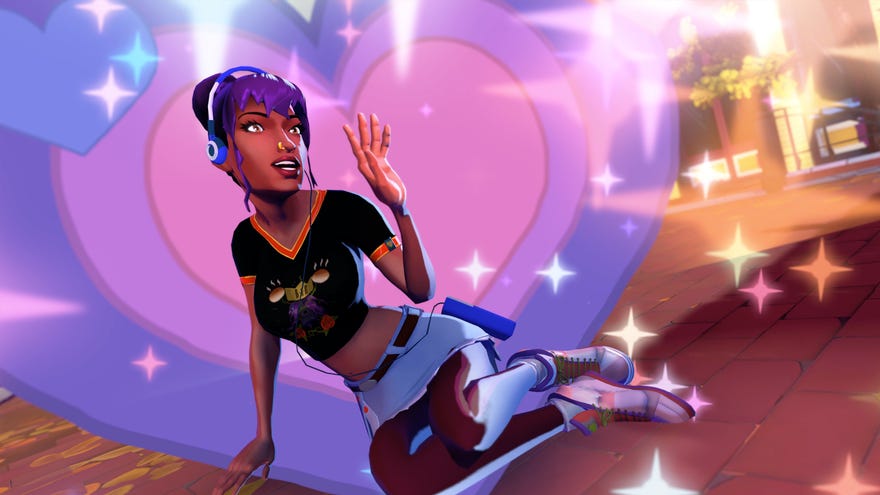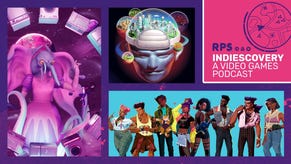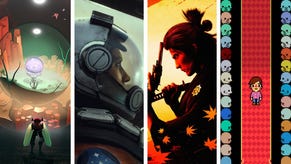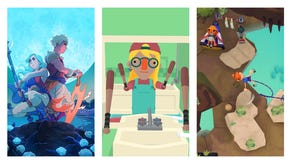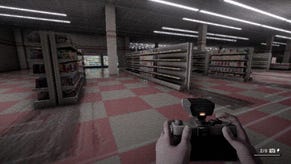Thirsty Suitors review: a breezy, janky RPG with emotional maturity
Pro Dater
Thirsty Suitors is a dazzling new entry in a genre that is always badly in need of bolstering: turn-based RPGs without anime aesthetics and a story about something other than killing God. The game sees you play as Jala, who returns to her dilapidated hometown after getting dumped by the older woman for whom she abandoned college and her high school sweetheart. Waiting for her is a disappointed mother, a soon-to-be-wed sister who refuses to even speak to her, and a shadowy cabal formed of her spurned exes from the time in her life when rampant, unrelenting teen horniness nearly ripped the town apart. Jala’s journey to redemption and genuine adulthood will take her to the psychic plane to do cathartic (if overly simplistic) battle with her wronged exes, to the local skatepark to pull off some janky grinds, and to grounded emotional revelations that are rarely written this well in videogames.
It’s refreshing, in a genre that so frequently casts you as a chosen one or a legendary hero, to play something that is this comfortable with having such an openly flawed protagonist. Thirsty Suitors doesn’t go easy on Jala as it reveals the specifics of how she broke each heart in her wake. Each confrontation with an ex launches Jala into a heightened reality of crystal monsters, talking felines and superheroes, all taking place in their psyche as you work through the specifics of their grievances, both verbally and physically. The lack of typical random encounters or dungeons - save for a few designated spots on the map where you can engage in optional fights - lends the scuffles you do get into a little more weight.
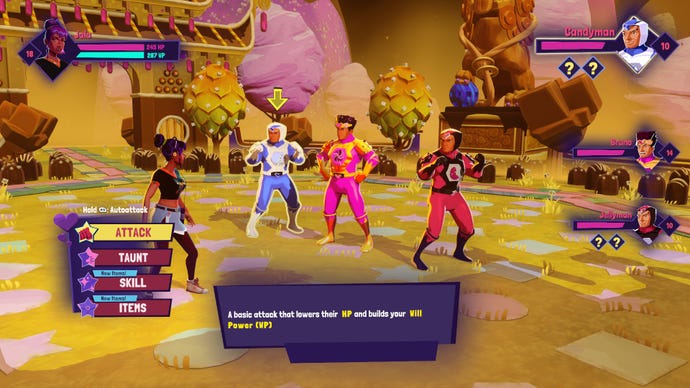
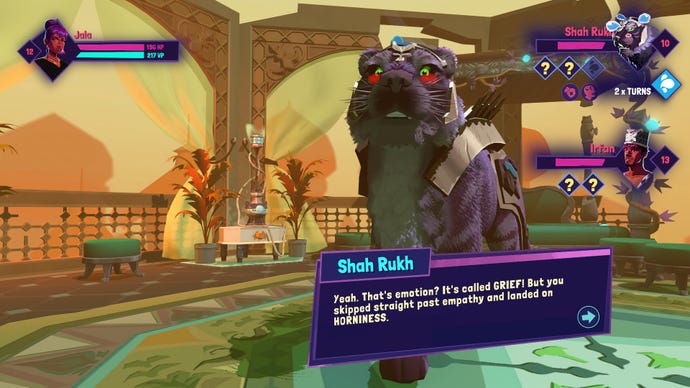
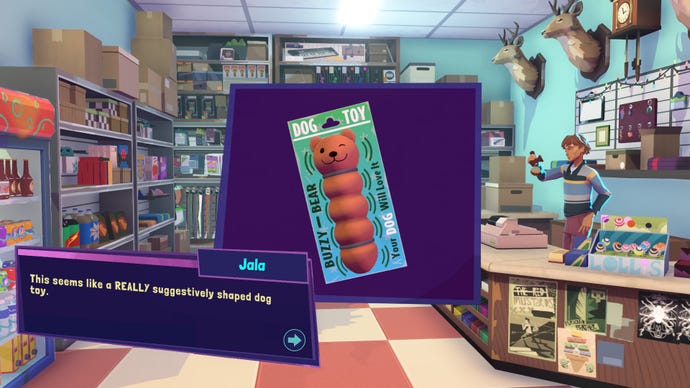
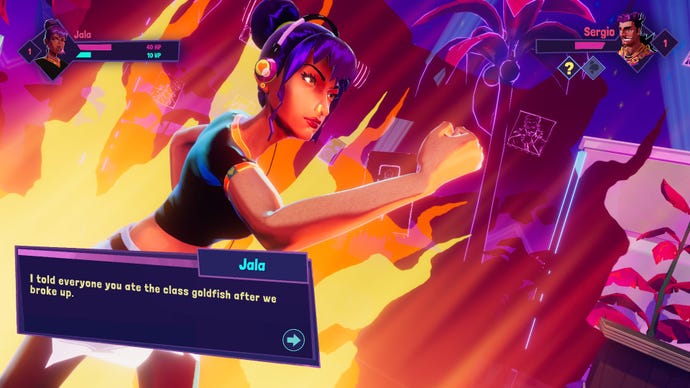
The fights are flashy and fun, and the banter between Jala and her opponents grounds them with the rest of the story in a way that sets them apart from traditional turn-based RPG encounters. While they shine in terms of visuals and storytelling, they’re a bit lacking on the complexity front. All but a handful of fights play out with exactly the same rhythm - working out which of five debuffs an enemy is weak to, and then casting one or two skills to take advantage of it. For the bosses, it’s usually just a matter of firing off your myriad summons: unlockable attacks where you call for an overpowered favour from friends and family. Jala is a solo operator, so there isn’t a party to bounce off of either.
While you might not have a party to bounce off, you do have a skateboard at least. Jala is something of a legend to the cool, skateboarding teens of her hometown and it’ll be your main mode of transportation as you cut about. The town centre and the local abandoned amusement park where you spend most of your time are littered with rails and gaps and walls to bounce off. You can pull off a few tricks, chain them into combos and hit big combo finishers to cap them off with a flourish. There are multiple challengers to complete and skaters to unlock. The times where you’ll be on foot instead of on your board are few and far between. Which is why it’s such a shame that the skateboarding is, well… complete bobbins.
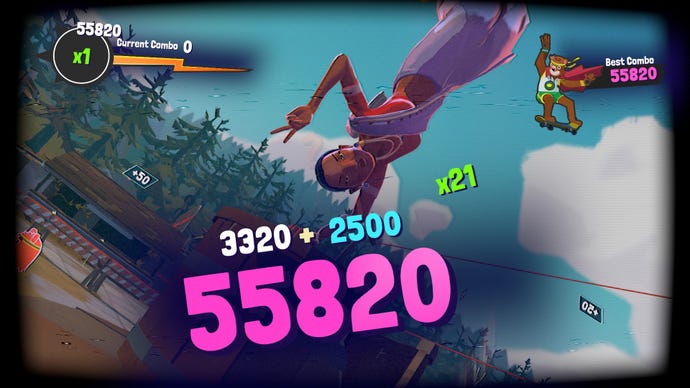
The bones and the physics of the boarding just aren't present. It’s a leaden, joyless thing. It feels like the sort of skateboarding you might have been subjected to as a minigame in an otherwise non-skateboarding game twenty years ago. There’s only a handful of tricks, and all of the unlockable skaters handle identically, even if they’re a dog. You will need to drastically increase the turning speed to have even an alright time, and sequences are frustratingly difficult to get out of once you’ve committed to them - once you’re airborne, you automatically grind or interact with any other element you come into contact with. Engaging with most of it is, blessedly, optional.
There’s also cooking, which, just like the combat, is far more successful from a writing standpoint than a mechanical one. Ostensibly a system to craft healing and buffing items for later use in battle, it’s really just an excuse for Jala to try to bond with her mother while dodging her legendary passive aggression. The combat is easy enough that you’ll most likely never touch anything you craft, but exchanging barbs while chopping tomatoes is a nice little twist on cooking minigames, even if the repetitive QTEs and animations mostly feel like something you just have to endure to get to all the far more exciting family gossip.
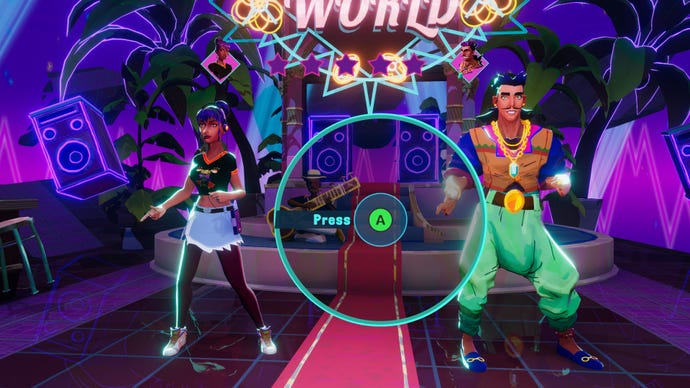
QTEs are everywhere, by the way. Every attack other than Jala’s basic one requires a few inputs that don’t really follow any particular rhyme or reason. This isn’t the Mario RPG thing where it feels reactive or makes some tactile sense. Their most baffling use is in a very slight dancing minigame, where you’d assume the game’s pop soundtrack would at least be used in something approaching a rhythm-action sequence. Instead, you sit and watch Jala and her partner cycle through a handful of animations while tapping out the same few sequences of buttons, completely detached from the music, until it’s over.
As an RPG, Thirsty Suitors is too simplistic to really be particularly engaging. The traditional, systems-based pleasures of the genre just aren’t here - you won’t be meticulously guiding stats for ideal builds or pulling off complicated strategies. You don’t even need to level grind, since the experience gained just from the mandatory fights and cooking sessions will make you more than a match for anything you face. You can completely ignore the items, seeing as how you’re never going to see your health bar fall lower than halfway. It’s forgiving to the point where it feels like it doesn’t even really need you there at all.
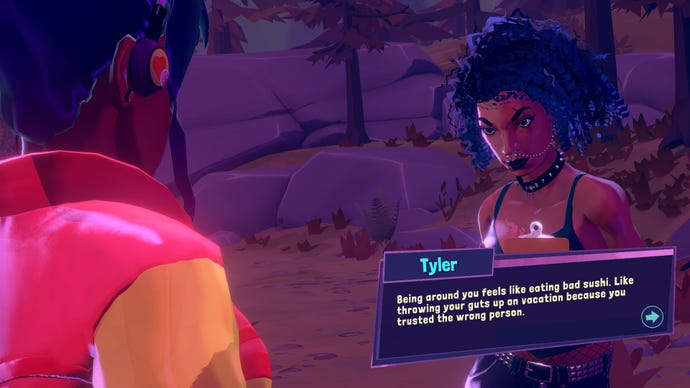
Although, it’s easy to forgive bobbins skateboarding and repetitive combat when each night, Jala’s dad gives her a piggyback up the stairs after she’s fallen asleep during a Twilight Zone marathon. A buff, lesbian auntie acting as the town’s queer elder more than makes up for having to tap away at some naff QTEs. Horny turn-based RPG skateboarding hybrid is an admittedly exciting sales pitch, and it is a shame that the concept never really comes together. But Thirsty Suitors excels at areas that other games in this genre rarely even attempt, never mind handle this well.
Ultimately though, the game is quick and breezy enough that none of these shortcomings have the chance to become truly grating, and the writing and visuals are strong enough on their own to carry you through Jala’s little reconciliation saga. In a genre that is frequently achingly white and straight, it’s a balm just to have something that is so resolutely neither. And it’s downright exciting to play something that, in place of overblown fantasy worldbuilding, is more interested in reflecting cultures, demographics, and relatable struggles that rarely get a spotlight in mainstream games.
This review is based on a copy of the game provided by the developers Annapurna Interactive.
